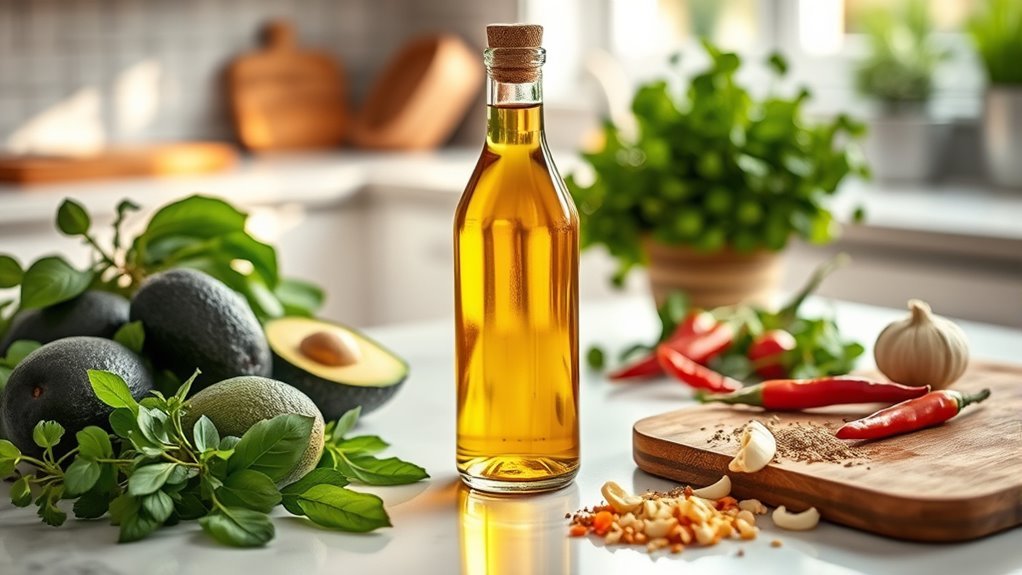Yes, peanut oil is keto-friendly because it’s high in fat and low in carbs, making it a suitable option for those on a ketogenic diet. It contains about 14 grams of fat per tablespoon, primarily monounsaturated and polyunsaturated fats, which support heart health. However, keep in mind its high calorie density and potential for allergenic reactions. If you want to learn more about peanut oil’s benefits and cooking techniques, there’s plenty of helpful information ahead.
Understanding the Keto Diet

When you commence on the keto diet, understanding its fundamental principles is vital for success. At its core, the keto diet focuses on high fat, moderate protein, and very low carbohydrate intake. This approach encourages your body to enter ketosis, a metabolic state where fat becomes the primary energy source. You’ll face dietary restrictions, mainly avoiding sugars and grains, which can be challenging but liberating once you adapt. Embracing healthy fats—like avocados, nuts, and olive oil—enhances your experience. It’s important to educate yourself about suitable food choices while respecting your body’s needs. Remember, the objective is to enjoy the freedom that comes with informed dietary decisions, allowing you to pursue a healthier lifestyle without feeling deprived.
Nutritional Profile of Peanut Oil

When considering peanut oil, it’s important to look at its fat composition and caloric density. This oil primarily contains monounsaturated and polyunsaturated fats, which can be beneficial for heart health. Additionally, its caloric density is relatively high, making it essential to use in moderation, especially on a keto diet.
Fat Composition Analysis
Although peanut oil is often praised for its culinary versatility, understanding its fat composition is essential for those following a ketogenic diet. The fatty acid composition of peanut oil primarily consists of monounsaturated fats, which can be beneficial for heart health. Around 48% of its fat content is oleic acid, a type of omega-9 fatty acid. However, it also contains polyunsaturated fats, including omega-6 fatty acids, which should be consumed in moderation. The oil extraction methods, such as cold-pressing or refining, can affect its nutritional profile, with cold-pressed oils retaining more nutrients. Knowing these details helps you make informed choices that align with your dietary needs while enjoying the benefits peanut oil has to offer in your cooking.
Caloric Density Overview
Peanut oil packs a significant caloric punch, with approximately 120 calories per tablespoon. This high caloric density means that even small amounts can contribute substantially to your daily intake. If you’re following a keto diet, it’s essential to reflect on how these calories fit into your overall dietary strategy. While the oil is rich in healthy fats, it’s easy to overconsume and potentially miss out on other important nutrients. Balancing your intake is imperative; think about how peanut oil interacts with your meals and overall dietary impact. Using it sparingly can enhance flavors without derailing your nutritional goals. So, when using peanut oil, be mindful of portion sizes to maintain that freedom in your keto journey.
Health Benefits of Peanut Oil

Peanut oil offers several health benefits that might interest you, especially if you’re looking for heart-healthy options. It’s rich in antioxidants, which can help protect your cells from damage, and its high smoke point makes it a great choice for cooking at high temperatures. These factors can contribute to a balanced diet while supporting overall well-being.
Heart Health Benefits
When considering heart health, incorporating peanut oil into your diet may offer several benefits due to its unique composition. Research indicates that peanut oil can help improve cholesterol levels, as it contains monounsaturated fats that are known to raise HDL (good cholesterol) while lowering LDL (bad cholesterol). This balance can potentially reduce the risk of heart disease, making it a heart-healthy choice. Additionally, peanut oil is relatively low in saturated fats, which are linked to increased heart disease risk. By using peanut oil in moderation, you can enjoy its flavorful benefits while supporting your overall cardiovascular health. Just remember, moderation is key, and pairing it with a balanced diet will further enhance your heart health journey.
Rich in Antioxidants
While you might think of cooking oils primarily for their flavor and cooking properties, peanut oil also stands out for its rich antioxidant content. These antioxidants can offer several health benefits, making peanut oil a valuable addition to your kitchen.
- Supports immune function
- Reduces inflammation
- Enhances skin health
- Promotes heart health
- Fights oxidative stress
In addition to its antioxidant benefits, peanut oil’s diverse cooking applications make it a versatile choice for sautéing, frying, or dressing salads. By incorporating peanut oil into your diet, you can enjoy not just delicious meals, but also the protective effects of its antioxidants. So, whether you’re cooking up a stir-fry or drizzling it over veggies, peanut oil can be a smart, health-conscious choice.
High Smoke Point
If you’re looking for a cooking oil that can withstand high temperatures without breaking down, peanut oil is an excellent choice due to its high smoke point of around 450°F (232°C). This smoke point benefits you by providing cooking stability, allowing for frying and sautéing without the risk of producing harmful compounds. When oils reach their smoke point, they can degrade and release free radicals, which isn’t ideal for your health. Peanut oil’s resilience against heat means you can use it in various cooking methods while maintaining its nutritional integrity. Additionally, its neutral flavor won’t overpower your dishes, making it a versatile option for those following a keto-friendly diet. Enjoy the freedom to cook confidently with peanut oil!
Potential Drawbacks of Peanut Oil
Although peanut oil is often praised for its flavor and high smoke point, there are several potential drawbacks to assess, especially for those following a keto diet. Here are some concerns to examine:
- Allergy Concerns: Peanut oil can trigger allergic reactions in sensitive individuals.
- Omega Imbalance: It contains a high amount of omega-6 fatty acids, which may disrupt the omega-3 to omega-6 ratio in your diet.
- Caloric Density: While keto promotes fats, peanut oil is calorie-dense, which can lead to overconsumption.
- Processing: Some peanut oils are heavily refined, stripping away nutrients.
- Flavor Profile: The strong flavor may not suit every dish or preference, limiting its versatility.
Being aware of these drawbacks can help you make informed choices in your keto journey.
Peanut Oil vs. Other Cooking Oils
When comparing peanut oil to other cooking oils, you’ll want to evaluate their nutritional profiles, smoke points, and flavors. Each oil has unique characteristics that can influence your cooking choices, especially on a keto diet. Understanding these differences can help you make informed decisions that align with your dietary goals.
Nutritional Profile Comparison
While evaluating the nutritional profile of peanut oil, it’s essential to compare it with other common cooking oils to understand its role in a keto diet. Peanut oil offers several nutritional benefits, but you might want to explore oil alternatives as well. Here’s a quick comparison:
- Peanut Oil: High in monounsaturated fats and vitamin E.
- Olive Oil: Rich in antioxidants and heart-healthy fats.
- Coconut Oil: Contains medium-chain triglycerides (MCTs) for quick energy.
- Avocado Oil: High smoke point with beneficial fats and nutrients.
- Canola Oil: Low in saturated fat, but often highly processed.
Smoke Point Differences
Understanding the smoke point of cooking oils is important for those following a keto diet, as it affects both cooking methods and flavor. The smoke point indicates when an oil begins to break down, impacting oil stability and potentially releasing harmful compounds. Peanut oil has a relatively high smoke point of around 450°F, making it suitable for frying and high-heat cooking. In comparison, other oils vary considerably.
| Cooking Oil | Smoke Point (°F) | Oil Stability |
|---|---|---|
| Peanut Oil | 450 | High |
| Olive Oil | 375 | Moderate |
| Coconut Oil | 350 | High |
| Avocado Oil | 520 | Very High |
| Canola Oil | 400 | Moderate |
Choosing the right oil can enhance your keto cooking!
Flavor and Versatility
Peanut oil offers a unique flavor profile that can elevate a variety of dishes, especially in Asian cuisine where its nutty taste complements stir-fries and marinades. Its versatile cooking properties make it a favorite among many chefs and home cooks alike.
Here are some key points about peanut oil:
- Flavor Enhancement: Adds a distinct nuttiness to dishes.
- Versatile Cooking: Ideal for frying, sautéing, and baking.
- Culinary Applications: Works well in dressings, sauces, and marinades.
- High Smoke Point: Perfect for high-heat cooking without breaking down.
- Balanced Profile: Contains healthy fats that support a ketogenic diet.
When considering oils for your kitchen, peanut oil stands out for its flavor and versatility, making it a great option for those seeking culinary freedom.
How Peanut Oil Fits Into a Keto Diet
When considering oils for a keto diet, peanut oil can be a suitable option due to its high-fat content and low carbohydrate profile. One of the significant peanut oil benefits is its ability to provide essential fatty acids, which can support your overall health while keeping you in ketosis. It’s perfect for keto meal prep, allowing you to sauté, stir-fry, or dress salads without compromising your macronutrient goals. With about 14 grams of fat per tablespoon and minimal carbs, you can enjoy the rich flavor of peanut oil while maintaining your desired fat-to-carb ratio. Just be mindful of portion sizes, as consuming too much can lead to excess calories. Overall, peanut oil can fit nicely into your keto lifestyle.
Cooking Techniques With Peanut Oil
Incorporating peanut oil into your cooking routine opens up a variety of techniques that can enhance flavor and texture in your dishes. Its high smoke point makes it ideal for various methods, allowing you to experiment with flavors seamlessly.
Incorporating peanut oil into your cooking enhances flavor and texture, thanks to its high smoke point and versatility.
- Frying techniques: Perfect for crispy fried foods.
- Sautéing methods: Adds a rich, nutty flavor to vegetables and proteins.
- Salad dressings: Creates a creamy texture when blended with vinegar or citrus.
- Marinades usage: Infuses meats with distinct taste while tenderizing.
- Stir-frying: Enhances the taste of stir-fried dishes with its robust properties.
With its versatility, peanut oil can elevate your culinary creations while keeping them keto-friendly.
Recipes Using Peanut Oil for Keto
If you’re looking to add some variety to your keto meal plan, recipes that utilize peanut oil can be a fantastic option. Peanut oil is great for keto frying due to its high smoke point and nutty flavor. Here are a few delicious peanut oil recipes to reflect upon:
| Recipe | Description |
|---|---|
| Fried Cauliflower Rice | A low-carb alternative to rice, stir-fried in peanut oil with veggies. |
| Keto Chicken Wings | Crispy wings fried in peanut oil, seasoned with your favorite spices. |
| Asian-style Zucchini Noodles | Noodles sautéed in peanut oil with garlic and soy sauce for a flavorful dish. |
Incorporating these recipes into your meal plan not only adds flavor but also keeps you aligned with your keto goals. Enjoy the freedom of delicious cooking!
Storage and Shelf Life of Peanut Oil
Although peanut oil is a versatile cooking oil, its storage and shelf life are essential factors to evaluate for maintaining its quality. To keep your peanut oil fresh and flavorful, consider these storage tips:
- Store in a cool, dark place to avoid light exposure.
- Seal the bottle tightly to minimize air contact.
- Use within 6-12 months after opening for peak freshness.
- Keep away from heat sources like stovetops and ovens.
- Check for rancidity before use; a foul smell indicates spoilage.
Making the Right Choice for Your Pantry
How can you confirm that your pantry is stocked with oils that align with your dietary preferences? Start by identifying your pantry essentials—oils that support your health goals, especially if you’re following a keto diet. Peanut oil, while versatile, may not be the best fit for everyone. Consider oil alternatives like avocado or olive oil, which have higher monounsaturated fats and are generally more compatible with keto. Always check labels for additives that might disrupt your dietary plan. It’s important to choose oils that not only taste good but also align with your nutritional needs. By making informed choices, you can make certain your pantry is a haven for health without sacrificing flavor or freedom in your cooking.
Frequently Asked Questions
Can Peanut Oil Trigger Allergies in Sensitive Individuals?
Yes, peanut oil can trigger allergies in sensitive individuals. If you have a peanut allergy, even trace amounts can lead to severe reactions, such as hives, difficulty breathing, or anaphylaxis. It’s essential to be cautious, as some refined peanut oils might be safe for those with mild sensitivities, but reactions vary widely. Always consult with a healthcare professional before incorporating any new oils into your diet, especially if you know you’re sensitive to peanuts.
Is Refined Peanut Oil Better for Keto Than Unrefined?
When considering refined versus unrefined peanut oil, it’s essential to weigh the refined benefits against the unrefined drawbacks. Refined peanut oil undergoes processing that removes impurities, making it less likely to trigger allergies and suitable for higher cooking temperatures. However, unrefined oil retains more nutrients and flavor, which some may prefer. Ultimately, if you’re pursuing a keto lifestyle, refined peanut oil might be a better choice for its versatility and stability in cooking.
How Does Peanut Oil Compare in Taste to Other Oils?
When it comes to peanut oil flavor, it’s distinctively nutty and slightly sweet, which can enhance various dishes. Its culinary versatility allows it to shine in stir-fries, dressings, and frying, giving foods a rich taste. Compared to oils like olive or canola, peanut oil’s flavor is more pronounced, making it a great choice for those seeking to add depth to their meals. This unique profile can elevate your cooking experience considerably.
Does Peanut Oil Contain Any Carbohydrates?
Peanut oil has a favorable nutritional profile, as it contains negligible carbohydrates. Its oil composition primarily consists of fats, mainly monounsaturated and polyunsaturated fats, which are beneficial for heart health. Since you’re looking for options that align with a low-carb lifestyle, you’ll find that peanut oil can be a suitable choice. Just remember to evaluate how it fits into your overall dietary goals and the flavors it brings to your dishes.
Can I Use Peanut Oil for Deep Frying on a Keto Diet?
Imagine you’re hosting a gathering and want to impress your guests with perfectly deep-fried chicken. You can use peanut oil for deep frying, as it has a high smoke point and offers great flavor. While it’s not the only option, you might consider keto-friendly alternatives like avocado oil or coconut oil, which also provide health benefits. Ultimately, it’s about balancing taste and health while enjoying the freedom to choose what fits your lifestyle.
Frequently Asked Questions about Peanut Oil and the Keto Diet
1. Is peanut oil suitable for a keto diet?
Yes, peanut oil is considered suitable for a keto diet. It is a high-fat oil that is low in carbohydrates, making it compatible with the macronutrient ratios typically recommended for ketogenic eating. With about 14 grams of fat and 0 grams of carbs per tablespoon, peanut oil can fit well into a low-carb lifestyle.
2. What are the health benefits of using peanut oil on a keto diet?
Peanut oil offers several health benefits, especially when used in moderation on a keto diet. It is rich in monounsaturated fats, which are known to support heart health by improving cholesterol levels. Additionally, peanut oil contains vitamin E, an antioxidant that helps protect the body from oxidative stress. However, it’s important to balance peanut oil with other healthy fats to ensure a variety of nutrients.
3. Does peanut oil have a high smoke point, and is it safe for cooking?
Yes, peanut oil has a high smoke point of around 450°F (232°C), making it an excellent choice for frying and sautéing. Its high smoke point means that it can withstand higher temperatures without breaking down and creating harmful compounds, making it safe for various cooking methods, including deep frying, which is often used in keto-friendly recipes.
4. Are there any downsides to using peanut oil on a keto diet?
While peanut oil can be a healthy option, there are some downsides to consider. For individuals with peanut allergies, consumption is obviously not advisable. Additionally, peanut oil is still high in omega-6 fatty acids, which can promote inflammation if consumed excessively relative to omega-3 fatty acids. It’s important to use it in moderation and balance it with other sources of healthy fats.
5. How can I incorporate peanut oil into my keto meal plan?
Incorporating peanut oil into your keto meal plan can be simple and delicious. Use it for frying low-carb vegetables, marinating meats, or as a base for salad dressings. You can also drizzle it over cooked dishes for added flavor. Just remember to consider the overall balance of fats in your diet, and complement peanut oil with other healthy fats like olive oil, avocado oil, or coconut oil for variety.
References
- https://www.healthline.com/nutrition/peanut-oil-keto-friendly
- https://www.ncbi.nlm.nih.gov/pmc/articles/PMC7000513/
- https://www.webmd.com/diet/health-benefits-peanut-oil
- https://www.medicalnewstoday.com/articles/324390
- https://www.verywellfit.com/peanut-oil-nutrition-facts-5183508
- https://www.health.harvard.edu/staying-healthy/the-truth-about-fats
- https://www.heart.org/en/news/2021/02/26/are-all-fats-created-equal-what-to-know-about-fats-and-heart-health
- https://www.cdc.gov/nutrition/data-statistics/know-your-fats.html


